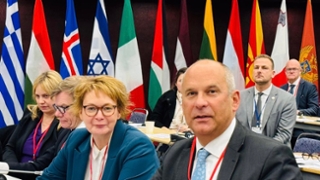Commenting on the election of the new Presidium, State Secretary Poseck (Hesse) stated, “I am delighted that Germany is once again also assuming a more substantial role within the Assembly through the Head of the German delegation to the NATO PA. I would like to congratulate Mr Wadephul on his election and wish him every success in his role as Vice-President of the Assembly.” Marcos Perestrello de Vasconcellos from Portugal was elected as the new President of the NATO PA.
Daniela Behrens, Lower Saxony’s Minister of the Interior and Sport; Roman Poseck, Hesse’s State Secretary of the Interior, Security and Homeland Protection (f. l. t. r.) with Member of the Bundestag Johann Wadephul (4th from. r.) and others.
© NATO Parliamentary Assembly
Transatlantic Alliance
The conference, which marked NATO’s 75th anniversary, focussed on ways to meet the challenges that the transatlantic Alliance faces today in the light of current geopolitical threats. State Secretary Poseck recognised the importance of NATO and the Parliamentary Assembly, noting that the transatlantic Alliance “is the cornerstone of our freedom and security”.
“NATO Is More Important Than Ever”

Daniela Behrens (Lower Saxony) and Roman Poseck (Hesse) in the plenary session. In the background, Bundestag Members Johann Wadephul and Marja-Liisa Völlers
© Bundesrat
Five years after French President Emmanuel Macron declared NATO “brain dead”, the Alliance’s true importance has been highlighted by Russia’s invasion of Ukraine, in violation of international law, along with Finland and Sweden’s accession to NATO. To cite Poseck, “NATO is more important than ever today. The conflict in the Middle East as well as armed conflicts elsewhere present huge challenges for the Alliance. Donald Trump’s re-election as US President gives rise to further questions as to the Alliance’s future organisation. We therefore also focused in particular on the future role of the USA within NATO”.
NATO Membership of Ukraine
Members of the Ukrainian parliament, the Verkhovna Rada, also took part in the Annual Session. Yehor Cherniev, Head of the Ukrainian delegation, presented an urgent call for NATO member countries to provide further support for Ukraine. The German delegation had already met with the Ukrainians on the first day of the session for bilateral talks with a view to obtaining first-hand information about the current situation in Ukraine. Ruslan Stefanchuk, Chairman of the Verkhovna Rada, called for support for early NATO membership for Ukraine. He stated that inviting the country to join NATO would constitute the greatest political defeat for Russian President Vladimir Putin.
German Support for Ukraine
In view of the deteriorating military situation in Ukraine, State Secretary Poseck stated, “Germany stands firmly with Ukraine. NATO Security Assistance and Training for Ukraine will in future coordinate the Alliance’s arms deliveries and training activities for the Ukrainian armed forces from Wiesbaden, capital of the German state of Hesse”.
NATO Protects Over a Billion People

70th Annual Session of the NATO Parliamentary Assembly in Montreal – View of the plenary hall
© HOC-CDC, 2024 | Christian Diotte
The plenary session opened with an address from the Prime Minister of Canada, Justin Trudeau, to the assembled parliamentarians. Trudeau emphasised that they represented more than a billion people in the thirty-two NATO member countries. He also noted that their consensus on shared values was being challenged in many ways by various actors. He underlined that this made NATO’s support for peace, freedom, and universal values all the more important, noting his conviction that the international community can only meet the current challenges if it pulls together and remains united.
Background Information
Since 1955, the Assembly has been the interparliamentary organisation of the North Atlantic Alliance. It provides a forum where 281 parliamentarians from the 32 NATO member countries meet regularly to discuss key security and defence issues. The latest developments in research and technology in this area, questions pertaining to the democratic resilience of the Alliance and its members, and Alliance strategies are also addressed there. Since Europe’s division has been overcome, the Assembly has also addressed cross-border issues such as climate change mitigation, energy security, and migration.
The full Parliamentary Assembly meets twice a year. The German delegation is made up of eighteen members – twelve German Bundestag Members and six Bundesrat members. The German delegation is headed by Johann Wadephul, Member of the Bundestag. State Secretary Poseck, as Head of the Bundesrat delegation, is also Deputy Head of the German delegation.

